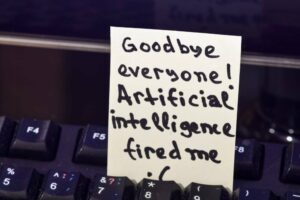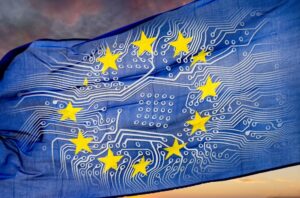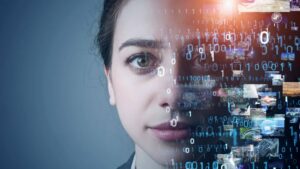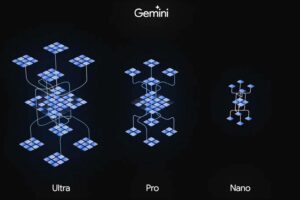AI in brief Researchers have helped a woman paralyzed by a brain stem stroke to speak through a digital avatar, thanks to AI algorithms that analyze her brain waves and translates them into speech and simulated movements.
The patient, identidied as “Ann”, can move her facial muscles but cannot speak.
Computer scientists trained a recurrent neural network to map her brain signals to 39 different phonemes – the units of sound that we assemble into words as we speak. Anna’s brain waves were measured using a brain-computer interface. After training, the model learned to decode her thoughts into phonemes which were then spoken by an on-screen digital avatar.
You can see how it works in the video below.
The tech was developed by a team of computer scientists at the University of California, San Francisco, and the University of California, Berkeley, who hope it will lead to creation of a regulator-approved device that will help paralyzed people to express themselves.
Ann can talk through her digital avatar at a rate of 62 words per minute – roughly 40 per cent as fast as typical speech – with a word error rate of 23.8 per cent across the system’s 125,000-word vocabulary. Details of the research have been published in a paper in Nature.
“When I was at the rehab hospital, the speech therapist didn’t know what to do with me,” said Ann. “Being a part of this study has given me a sense of purpose. I feel like I am contributing to society. It feels like I have a job again. It’s amazing I have lived this long; this study has allowed me to really live while I’m still alive!”
Google strikes deal to make AI-generated music
Copyright is a huge issue facing generative AI services, with developers critized and sued for scraping vast amounts of material scraped from the internet to train large language models without asking for permission or offering payment. Now, publishers and writers are attempting to fight back against having their work used by AI without credit or compensation.
Music, however, is a much more regulated industry. Record companies lock down the rights to songs and are notoriously litigious. If anyone wants to train models on popular music to make better AI-generated jingles, paying royalties will be hard to avoid.
Google business unit YouTube has therefore partnered with Universal Music Group to develop music-generating AI responsibly.
“Together, we can embrace this new technology in a way that supports artists, songwriters, producers, and the industry as a whole while driving value for fans and pushing the bounds of what’s creatively possible,” YouTube stated in a blog post.
Google doesn’t seem to take the same careful or measured approach when it comes to text, however. Last month, it updated its privacy policy stating that it uses “publicly available information to help train Google’s AI models and build products and features like Google Translate, Bard and Cloud AI capabilities.”
News outlets are blocking OpenAI’s text crawler
Top publishers like CNN, Reuters, the Chicago Tribune and more have blocked OpenAI’s GPTBot from scraping text from their web pages.
OpenAI uses a crawler bot to collect data from the public internet to train its large language models. But some news publishers, including the Australian Broadcasting Corporation and the country’s Canberra Times and the Newcastle Herald, have made changes to their websites’ robot.txt file to prevent crawler bots from accessing their content, The Guardian first reported.
By blocking the GPTBot crawler, publishers can stop OpenAI collecting text without permission. The startup has recently come under fire from authors for training its models on their books.
Now news outlets are also starting to hit back. The New York Times also recently updated its terms of service stating that its content cannot be scraped to train AI models without explicit written consent.
Last month, OpenAI announced it had entered into a licensing agreement with Associated Press to use its archives dating back to 1985. News articles are important to developing a model that has up to date knowledge, and OpenAI may in future find it needs to pay publishers to access their content if more of them block the GPTBot. ®
- SEO Powered Content & PR Distribution. Get Amplified Today.
- PlatoData.Network Vertical Generative Ai. Empower Yourself. Access Here.
- PlatoAiStream. Web3 Intelligence. Knowledge Amplified. Access Here.
- PlatoESG. Automotive / EVs, Carbon, CleanTech, Energy, Environment, Solar, Waste Management. Access Here.
- PlatoHealth. Biotech and Clinical Trials Intelligence. Access Here.
- ChartPrime. Elevate your Trading Game with ChartPrime. Access Here.
- BlockOffsets. Modernizing Environmental Offset Ownership. Access Here.
- Source: https://go.theregister.com/feed/www.theregister.com/2023/08/28/ai_in_brief/
- :has
- :is
- $UP
- 125
- 1985
- 23
- 39
- 40
- 7
- 8
- a
- access
- accessing
- across
- After
- again
- against
- Agreement
- AI
- AI models
- AI services
- algorithms
- allowed
- also
- am
- amazing
- amounts
- an
- analyze
- and
- announced
- anyone
- approach
- archives
- ARE
- articles
- Artists
- AS
- associated
- At
- attempting
- Australian
- authors
- available
- avatar
- avoid
- back
- BE
- been
- being
- below
- Berkeley
- Better
- Block
- blocked
- blocking
- Blog
- Books
- Bot
- bots
- bounds
- Brain
- Brain-Computer Interface
- Broadcasting
- build
- business
- but
- by
- california
- CAN
- cannot
- capabilities
- careful
- Changes
- chicago
- Cloud
- CNN
- CO
- collect
- Collecting
- come
- comes
- Companies
- Compensation
- computer
- consent
- content
- contributing
- CORPORATION
- country
- crawler
- creation
- credit
- data
- Date
- Dating
- deal
- details
- develop
- developed
- developers
- developing
- device
- different
- digital
- do
- doesn
- down
- driving
- embrace
- entered
- error
- express
- facial
- facing
- fans
- FAST
- Features
- feel
- fight
- fight back
- File
- Find
- For
- Francisco
- from
- future
- generative
- Generative AI
- given
- google translate
- Group
- had
- Hard
- Have
- having
- help
- helped
- helps
- her
- Hit
- hope
- How
- However
- HTTPS
- huge
- i
- if
- important
- in
- Including
- industry
- information
- Interface
- Internet
- into
- issue
- IT
- ITS
- Job
- jpg
- Know
- knowledge
- Label
- language
- large
- Last
- lead
- learned
- Licensing
- like
- live
- Long
- made
- make
- map
- material
- May..
- me
- minute
- model
- models
- Month
- more
- move
- movements
- much
- Music
- Nature
- needs
- network
- neural network
- New
- New York
- news
- now
- of
- offering
- on
- OpenAI
- or
- Outlets
- pages
- Paper
- part
- partnered
- patient
- Pay
- paying
- payment
- People
- per
- permission
- plato
- Plato Data Intelligence
- PlatoData
- Popular
- possible
- Post
- press
- prevent
- Producers
- Products
- public
- publicly
- publishers
- purpose
- Pushing
- Rate
- really
- recently
- record
- regulated
- research
- researchers
- Reuters
- rights
- roughly
- royalties
- s
- same
- San
- San Francisco
- scientists
- see
- seem
- sense
- service
- Services
- signals
- Society
- some
- songwriters
- Sound
- speak
- speech
- spoken
- Starting
- startup
- stating
- Stem
- Still
- Stop
- Strikes
- Study
- sued
- Supports
- system
- Take
- Talk
- team
- tech
- Technology
- terms
- Thanks
- that
- The
- their
- Them
- themselves
- then
- therefore
- this
- Through
- to
- together
- Train
- trained
- Training
- translate
- typical
- unit
- units
- Universal
- university
- University of California
- updated
- use
- used
- uses
- using
- value
- Vast
- Video
- wants
- was
- waves
- Way..
- we
- web
- websites
- were
- What
- when
- which
- while
- WHO
- whole
- will
- with
- without
- woman
- Word
- words
- Work
- works
- written
- york
- youtube
- zephyrnet













